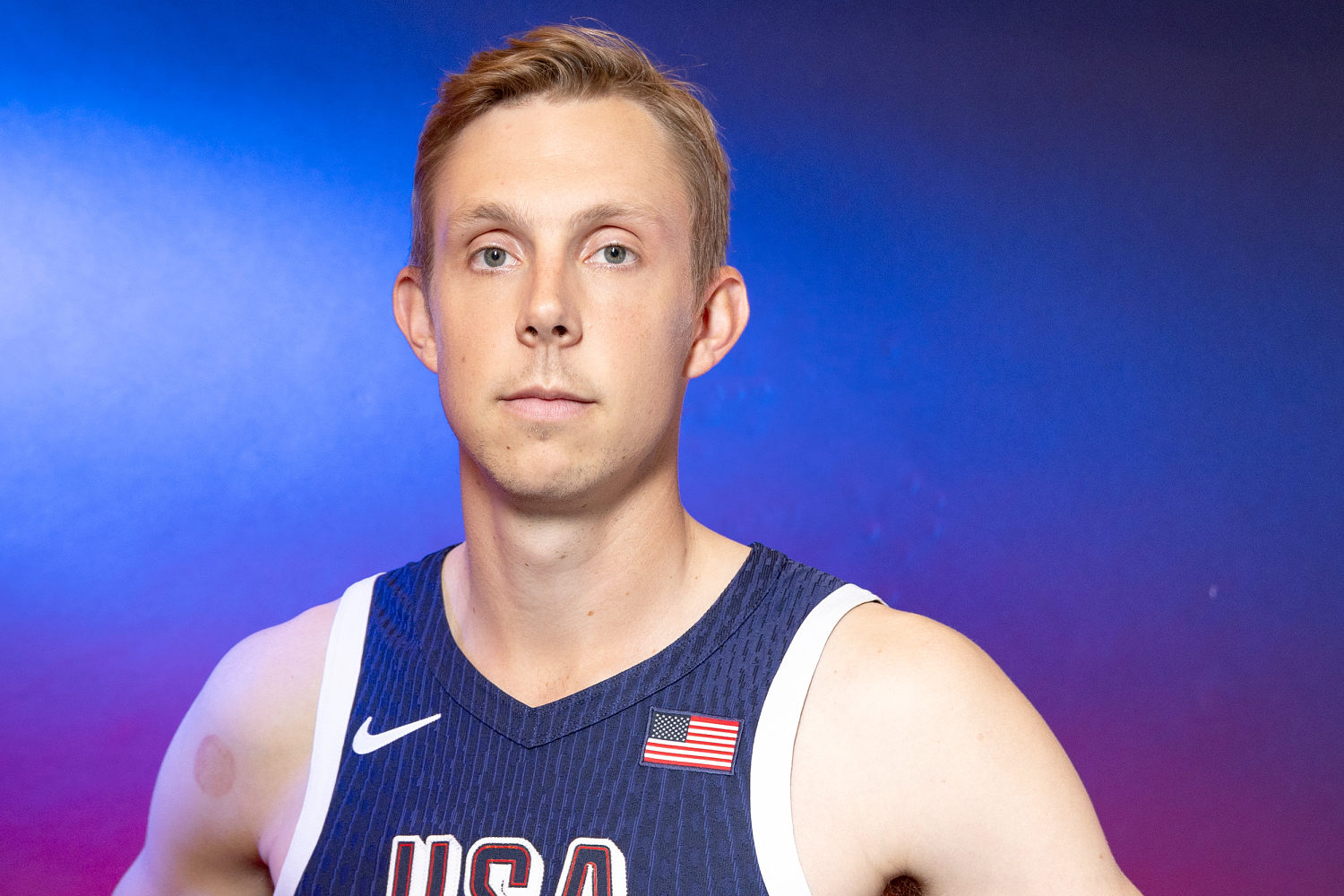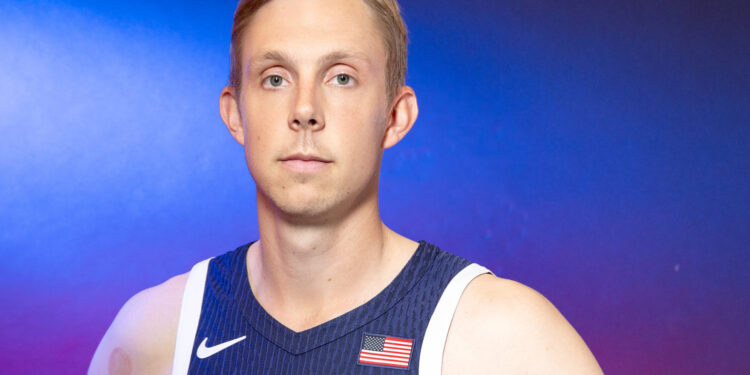
Former college basketball star Canyon Barry isn’t the only Olympian who has to balance 9-to-5 work with preparation for Paris. But Barry, a hoops scion with a bachelor’s degree in physics and a master’s in nuclear engineering, was probably the only Team USA athlete giving a high-level work presentation from Mongolia at 2 a.m. — the afternoon back home in Florida — last month while he was also getting ready for the Olympics.
“It’s definitely a grind at times,” Barry, who plays 3×3, said in an interview that started 30 minutes behind schedule … because he had to take a work call. “I’m so fortunate [my employers] are willing to work with me. That’s part of the Olympic spirit to do whatever you can try to succeed and pursue that dream.”
Scores of elite athletes have to put on their work boots before they lace up sneakers to run down Olympic aspirations. Sports psychologist Mark Aoyagi said the laboring athletes face a uniquely difficult challenge.
“It’s not ideal, certainly,” said Aoyagi, a professor at the University of Denver’s Graduate School of Professional Psychology. “That’s particularly if you’re comparing yourself to other countries where some athletes don’t have jobs — they’re being paid by their government. When you’re a looking at a Russian athlete or a Chinese athlete being paid, it can be challenging.”
In stark contrast to glitzy promos touting star athletes that will fill airwaves in the coming weeks, many performers on the Paris stage will be unknown Americans who work full- or part-time jobs to support their high-level endeavors.
“How do you do it? Athletes are great at compartmentalization, keeping one part of their life and their experiences from another,” Aoyagi said. “From a mental and emotional level, that’s key.”
Barry, the son of NBA Hall of Fame guard Rick Barry, has a strict regimen: up by dawn for weight training and yoga, going to L3Harris Technologies headquarters in Melbourne, Florida, for work, then off to the gym for basketball training after he punches out of the office.
The long days, Barry said, aren’t too different from his time as a College of Charleston undergrad and a University of Florida grad student, having to make the most of 24 hours while he was playing NCAA Division I basketball and taking high-level STEM classes.
“It definitely required good time-management skills,” he said. “It’s something I learned from college athletics. As you can imagine, a lot of those courses were challenging to take while trying to balance what’s basically a full-time job of collegiate basketball. But it prepared me for the real world and being able to manage my time and really figure out how to be efficient. Sometimes you don’t get much sleep, but you do what it takes.”
Still, Aoyagi worries that even the most well-organized working athlete in a stress-free, non-physically-taxing job could be a step slow.
“When you’re an athlete where one one-hundredth of a second is the difference from making the podium or not or the difference between gold and silver, the person who is on their feet for eight hours a day, 40 hours a week, for however many years is going to be at a disadvantage to the person who only has to worry about training and recovery,” said Aoyagi, who previously worked for U.S. Track & Field.
In addition to Barry, other working athletes include:
- Nic Fink, who was a college star at the University of Georgia before he earned his master’s in electrical and computer engineering from Georgia Tech. He works full-time, remotely, from Dallas for Quanta Utility Engineering Services.
- Fencer Kat Holmes, a Princeton alum who will make her third trip to the Olympics and has been packing for Paris in between a grueling academic schedule. She is set to be a doctor someday soon as a student at the Icahn School of Medicine at Mount Sinai in New York City.
- Sprint canoe gold medalist Nevin Harrison, who helps pay bills by working weekends at the country-themed bar Moonshine Beach in San Diego.
- Mechanical engineer and rock climber Jesse Grupper, who works remotely for a Harvard lab when he’s not scaling walls to potential Olympic glory.
- Breaker Sunny Choi, who just last year quit her gig as director of global creative operations at Estée Lauder’s skin care branch.
- Gabby Thomas, who won bronze in the 200 meters in Tokyo. She puts in hours at a health clinic for the uninsured in Austin, Texas.
- Parafencer Elle Geddes, who breeds horses in South Carolina.
- Fencers —and moonlighting models — Anne Cebula and Miles Chamley-Watson, who could be found strutting on the catwalk or posing for cameras when they weren’t on the piste.
- Former Stanford water polo star Dani Jackovich, an operations coordinator for swimwear maker Delfina Sport and a data analyst for the water polo tech firm 6-8 Sports. Jackovich will be in the water this summer for Australia and could face off against an American team with 6-8 co-founder Maggie Steffens.
Holmes, the fencer, said her best time management tools are old- fashioned paper and pen.
“I sit down and I write every single due date as far into the future as I can,” Holmes recently told CNBC. “When I’m done, I cross it off and I know I don’t have to deal with it.”
While athletes are well-trained to forget about a bad game or individual play, that doesn’t mean they’re well-equipped to deal with even the most mundane day-to-day work headaches that can build stress, Aoyagi said.
An athlete might be able to shake off one moment or one play or one day later. But an unresolved simple workplace squabble, if it’s not hashed out, can have a lingering impact.
“Athletes are typically good at [compartmentalization], but what they’re often not good at is going back to unpack it,” Aoyagi said. “If all you’re doing is stowing things away, they’re going to end up exploding at the worst possible time.
“One of the main things that we teach is how to unpack and process it. How do you work through those emotions that you compartmentalize in the moment so you can get on to the next thing?”







